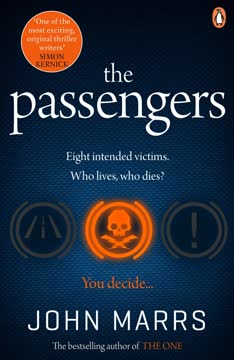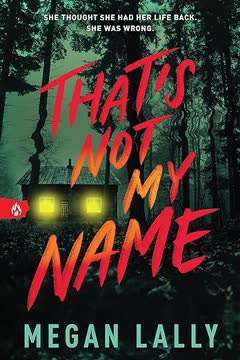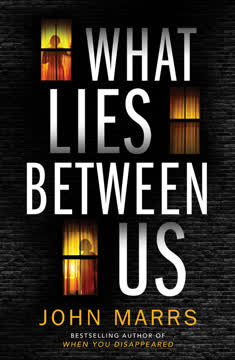Plot Summary
Cars Hijacked, Passengers Trapped
In a terrifying act of cyber-terrorism, eight autonomous vehicles are seized by an unknown hacker. The passengers, including a pregnant woman, a war hero, and a TV star, find themselves trapped, their lives hanging by a thread. The hacker's voice ominously informs them that they are on a collision course, and only one will survive. Panic ensues as the passengers realize they are powerless, their fates controlled by a faceless entity.
Public Jury Decides Fate
The hacker's twisted game involves a public jury tasked with deciding which passenger will live. The jury, composed of government officials and a reluctant civilian, Libby, must navigate the moral complexities of choosing who deserves to survive. As the world watches, the jury grapples with the weight of their decisions, knowing that their choices will determine life and death.
Secrets Unravel, Truths Revealed
As the jury interviews each passenger, shocking secrets come to light. Claire, the pregnant woman, is revealed to have her husband's body in the trunk. Sofia, the TV star, is exposed for covering up her husband's crimes. The hacker uses these revelations to manipulate public opinion, turning the passengers' lives into a spectacle of judgment and condemnation.
Desperation and Deception Unfold
With time running out, the passengers resort to desperate measures to sway the jury and the public. Lies and half-truths are spun in a bid for survival, but the hacker is always one step ahead, ready to expose their deceptions. The tension mounts as the passengers realize that their past actions may seal their fates.
The Hacker's Deadly Game
The hacker's motives remain shrouded in mystery, but his control over the situation is absolute. He forces the jury to confront their biases and prejudices, using the passengers' secrets as leverage. The hacker's game is a commentary on society's willingness to judge and condemn, a reflection of the darker aspects of human nature.
Love, Lies, and Betrayal
Amidst the chaos, personal relationships are tested. Sam and Heidi, a married couple, face the ultimate betrayal as secrets of infidelity and blackmail come to light. Libby, the civilian juror, is forced to confront her feelings for Jude, a passenger she met once and never forgot. As the clock ticks down, love and betrayal become intertwined, adding another layer of complexity to the unfolding drama.
Libby's Doubts and Decisions
As the jury deliberates, Libby struggles with her feelings for Jude, a passenger she once felt connected to. Despite her doubts, she is drawn to him, hoping he is different from the others. The pressure mounts as the countdown to the collision continues, and Libby must decide whether to trust her instincts or the evidence against him.
Jude's Confession and Revelation
In a tense exchange, Jude confesses to Libby that he had planned to end his life before the hijacking. His calm demeanor hides a deep sadness, and he shares his struggles with depression and the loss of hope. Libby is torn between her desire to save him and the realization that he may not want to be saved.
The Jury's Final Verdict
As the jury debates, tensions rise, and personal biases come to light. The decision is made to save Claire, the pregnant passenger, but the outcome is not what anyone expected. The hacker's game takes an unexpected turn, leaving the jury and the world in shock as the cars come to a halt without collision.
The Aftermath of the Hijacking
In the wake of the hijacking, the surviving passengers grapple with their new realities. Claire becomes a media sensation, while Libby struggles with the public's perception of her relationship with Jude. The world is left to ponder the implications of the hacker's actions and the vulnerabilities of technology.
The Hacker's True Identity
The mastermind behind the hijacking is unmasked as Alex, Jude's brother. Driven by revenge for the deaths of his family, Alex orchestrated the chaos to expose the flaws in the driverless car system. His confession to Libby reveals the depth of his anger and the lengths he went to for justice.
Jack Larsson's Reckoning
Jack Larsson, a key figure in the driverless car industry, is acquitted of wrongdoing but faces public outrage. As he plans his next move, the hacker's collective takes control of his car, leading to his demise. Jack's downfall serves as a stark reminder of the power and reach of those he underestimated.
Characters
Claire Arden
Claire is a teaching assistant expecting her first child. Her seemingly idyllic life is shattered when it's revealed that her husband's body is in her car. Her desperation to protect her unborn child drives her actions, but her hidden past complicates her plea for survival.
Jude Harrison
Jude, once a computer programmer, now lives out of his car. His connection to Libby, a juror, adds emotional depth to his plight. Jude's calm demeanor hides a deeper sadness, and his past choices come under scrutiny as the hacker's game unfolds.
Sofia Bradbury
Sofia is a celebrated actress whose charitable facade crumbles when her husband's crimes are exposed. Her attempts to manipulate public perception fail, leaving her reputation in tatters. Sofia's story highlights the dangers of living a life built on deception.
Sam Cole
Sam's secret second family is revealed, shattering his marriage to Heidi. His desperation to survive leads him to manipulate the jury, but his lies catch up with him. Sam's story is a cautionary tale of the consequences of deceit.
Heidi Cole
Heidi's composed exterior hides the turmoil of discovering Sam's betrayal. Her strength and resolve are tested as she fights for her life and the future of her children. Heidi's journey is one of resilience in the face of personal devastation.
Libby Dixon
Libby is a civilian juror who becomes emotionally invested in Jude's fate. Her journey is one of self-discovery and moral dilemmas as she navigates the complexities of the hacker's game and her feelings for Jude.
The Hacker (Alex Harris)
Alex is revealed as the hacker, driven by the loss of his family in a driverless car accident. His actions are fueled by a desire for justice and expose the vulnerabilities of technology and the moral failings of society.
Jack Larsson
Jack is a key figure in the driverless car industry, whose actions come under scrutiny. His downfall is a result of his hubris and the hacker's intervention, highlighting the consequences of unchecked power.
Plot Devices
Public Jury System
The hacker's use of a public jury to determine the passengers' survival is a critique of societal judgment. It highlights the ease with which people pass judgment based on limited information, reflecting the darker aspects of human nature and the influence of public opinion.
Secrets and Revelations
The revelation of each passenger's hidden life serves as a catalyst for the unfolding drama. These secrets are used by the hacker to manipulate public perception and challenge the jury's moral compass, driving the narrative forward and adding layers of complexity to the characters' motivations.
Time Pressure
The ticking clock adds urgency to the narrative, forcing characters to make quick decisions under pressure. This device amplifies the stakes, creating a sense of impending doom and compelling the jury and passengers to confront their deepest fears and desires.
Analysis
"The Passengers" by John Marrs is a gripping exploration of the intersection between technology and human morality. Through the harrowing ordeal of the hijacked passengers, the novel critiques society's reliance on technology and the ease with which people pass judgment based on limited information. The public jury system serves as a powerful metaphor for societal judgment, highlighting the darker aspects of human nature. The hacker's game forces characters and readers alike to confront their biases and prejudices, ultimately questioning the moral compass of modern society. The novel's exploration of secrets, deception, and the consequences of unchecked power offers a cautionary tale about the vulnerabilities of technology and the fragility of human morality.
Last updated:
FAQ
Synopsis & Basic Details
What is The Passengers about?
- A Cybernetic Death Game: The Passengers plunges eight strangers into a terrifying ordeal when their self-driving cars are simultaneously hacked, setting them on an unavoidable collision course. A mysterious "Hacker" forces a public jury, broadcast globally, to decide which single passenger will survive, turning their lives into a high-stakes, real-time ethical dilemma.
- Unveiling Hidden Lives: As the countdown to impact progresses, the Hacker systematically exposes the deepest, darkest secrets of each passenger, from hidden crimes and betrayals to personal struggles and moral compromises. This public shaming aims to influence the jury and global audience's life-or-death votes.
- A Societal Reckoning: Beyond the immediate suspense, the novel explores the ethical implications of advanced AI, the dangers of unchecked government power, and the voyeuristic nature of modern media and social judgment. It forces readers to confront uncomfortable questions about who deserves to live and who decides.
Why should I read The Passengers?
- Propulsive Ethical Thriller: John Marrs crafts a relentlessly paced narrative that combines cutting-edge technology with profound moral questions, making it impossible to put down. The novel's "ticking clock" mechanism and constant twists keep readers on the edge, eager to discover who lives and who dies.
- Deep Character Exploration: Despite the large cast, Marrs delves into the complex psychological landscapes of each passenger and juror, revealing their motivations, flaws, and surprising depths. This human element grounds the high-concept plot, making their struggles intensely relatable and emotionally resonant.
- Timely Societal Commentary: The book serves as a chilling commentary on our increasing reliance on technology, the erosion of privacy, and the power of public opinion in the digital age. It provokes thought on themes of justice, prejudice, and the true cost of "progress," making it highly relevant to contemporary concerns.
What is the background of The Passengers?
- Near-Future Autonomous Society: The story is set in a near-future Britain where Level 5 autonomous vehicles, completely devoid of manual override, have become the norm, replacing human drivers. This "Road Revolution" is presented as a government-led initiative promising unprecedented safety and efficiency, a key technological backdrop for the central conflict.
- Erosion of Privacy & Data Collection: A crucial element of the world-building is the pervasive nature of personal data collection. National Identity Cards and wearable tech (like fitness trackers) constantly gather intimate details about citizens' lives, from medical records to spending habits, which the Hacker exploits to expose the passengers. This highlights a societal shift towards ubiquitous surveillance.
- Critique of Government & Corporate Power: The narrative implicitly critiques the government's role in sanctioning and promoting this technology, particularly the hidden "social cleansing" protocol embedded in the AI. It also touches on the impact of this revolution on traditional industries (like bus drivers, car manufacturers) and the economic displacement it causes, providing a socio-political context for the Hacker's motives.
What are the most memorable quotes in The Passengers?
- "For every one of your actions today, there will be a reaction.": This chilling statement by the Hacker (Chapter 15) encapsulates the novel's core theme of cause and effect, particularly in the context of unchecked power and societal judgment. It foreshadows the Hacker's retaliatory acts and underscores the irreversible consequences of the jury's and public's choices.
- "You are worse than artificial intelligence because at least AI can be programmed to care.": Matthew Nelson's scathing rebuke to Cadman (Chapter 35) powerfully critiques human indifference and the dehumanizing effect of online anonymity. It highlights the novel's central debate: whether human morality, when exposed to public scrutiny and manipulation, is superior to programmed ethics.
- "People like you never win over people like me.": Jack Larsson's defiant taunt to Libby (Chapter 51) embodies the entrenched power dynamics and class divide that the Hacker seeks to expose. This quote, delivered just before Jack's own downfall, ironically foreshadows his ultimate defeat by the very forces he believes he controls, emphasizing the novel's exploration of hubris and comeuppance.
What writing style, narrative choices, and literary techniques does John Marrs use?
- Multiple Perspectives & Shifting POVs: Marrs employs a multi-perspective narrative, primarily using third-person limited point of view, rotating between the passengers, jurors, and the Hacker. This allows for a comprehensive understanding of each character's internal state and motivations, building suspense as readers gain fragmented insights into the unfolding drama.
- High-Concept Premise with Relentless Pacing: The novel is built on a compelling "what if" scenario (hijacked self-driving cars) and maintains a breakneck pace through short chapters, constant revelations, and a literal countdown clock. This creates an immersive, high-tension reading experience, characteristic of a psychological thriller.
- Social Commentary through Character Archetypes: Marrs uses his diverse cast of characters to represent various societal archetypes (the politician, the celebrity, the immigrant, the family man, the victim of abuse). Their exposed secrets and public judgment serve as a vehicle for sharp social commentary on prejudice, privacy, and the ethics of a data-driven world, making the narrative both entertaining and thought-provoking.
Hidden Details & Subtle Connections
What are some minor details that add significant meaning?
- Claire's "Baby TATE" Nickname: The seemingly innocent nickname for Claire's unborn child, "TATE" (Chapter 1), derived from Tate & Lyle sugar, subtly foreshadows the Hacker's later revelation about Ben's body. It hints at a hidden "weight" or burden Claire carries, and the domestic normalcy it represents is brutally contrasted with the grim reality of her situation.
- Jude's Outdated Car Model: Jude's refusal to upgrade his "outdated" driverless car (Chapter 2), despite financial incentives, initially seems like a minor character quirk. However, it later gains significance as it implies his early distrust or detachment from the very technology he helped create, subtly hinting at his deeper connection to the hacking collective and his disillusionment with the "road revolution."
- Sofia's Hearing Aids & Brandy: Sofia's malfunctioning hearing aids and frequent brandy consumption (Chapter 3) are initially presented as signs of her aging vanity and coping mechanisms. However, they subtly underscore her detachment from reality and her inability to fully grasp the gravity of her situation, making her initial "reality TV show" delusion more plausible and tragic.
What are some subtle foreshadowing and callbacks?
- Libby's Recurring Panic Attacks: Libby's history of panic attacks and PTSD, triggered by past traumas (Monroe Street, Nicky's death), is a recurring motif (Chapter 19). This foreshadows her intense emotional vulnerability during the inquest and her deep empathy for the passengers, particularly Jude, as she sees echoes of her brother's struggles in him.
- The Hacker's Knowledge of Juror Identities: The Hacker's early, seemingly random revelation of personal details about the jurors (Fiona's daughter, Muriel's wife, Jack's divorces - Chapter 14) subtly foreshadows his later exposé of Jack's financial secrets and the government's hidden agenda. It establishes his omniscient control and the pervasive nature of data collection long before its full implications are revealed.
- Sam's "We'll See" Response to Travel: Sam's repeated "we'll see" (Chapter 4) when Heidi suggests family trips abroad, contrasted with his solo visits to his mother in the Algarve, subtly hints at his double life and financial strain. This seemingly innocuous detail foreshadows the later revelation of his bigamy and the complex logistics he manages to maintain two families.
What are some unexpected character connections?
- Libby and Noah's Shared Trauma: The most profound unexpected connection is between Libby and Noah (the real Jude/Alex's brother). They both witnessed the same horrific Monroe Street accident (Chapter 26, 64), with Libby attempting to save Noah's dying family. This shared trauma, unknown to Libby until much later, forms the emotional core of the Hacker's motivation and his specific targeting of Libby.
- Claire and Ben's DNA Match: Claire's revelation that she and Ben were a "DNA Match" (Chapter 34) from the "Match Your DNA" service connects her story to John Marrs's other work, The One. This subtle intertextual reference adds a layer of tragic irony, as their "perfect" genetic match ultimately leads to a desperate, illegal act and Ben's death, questioning the infallibility of such systems.
- Jack Larsson's Connection to the Harris Family Business: Jack's indirect connection to the Harris family business (Chapter 69), through his shell company's stake and his decision to award their contract abroad, reveals a deeper, systemic corruption. This personal link to the very family he destroyed provides a direct, albeit hidden, motivation for Alex's revenge, making Jack's downfall a direct consequence of his past actions.
Who are the most significant supporting characters?
- Cadman, the Social Media Expert: Cadman (Chapter 22) serves as a crucial conduit for public opinion and a cynical commentator on societal trends. His role highlights the power and fickleness of social media, acting as a "sixth juror" and influencing the narrative by revealing real-time public sentiment, often with a detached, almost amoral, perspective.
- Commander Riley, the Police Liaison: Commander Riley (Chapter 22) represents the official, albeit often powerless, response to the crisis. His presence underscores the government's struggle to control the situation and the Hacker's superior technological prowess, revealing the limitations of traditional law enforcement against a sophisticated cyber threat.
- Oscar, Sofia's Pomeranian: Sofia's dog, Oscar (Chapter 3), is more than just a pet; he symbolizes her last remaining source of unconditional affection and a link to her humanity amidst her vanity and secrets. His presence in the car, and Sofia's protective actions towards him, offer fleeting glimpses of her softer side, making her eventual fate more poignant.
Psychological, Emotional, & Relational Analysis
What are some unspoken motivations of the characters?
- Claire's Desperate Maternal Instinct: Claire's primary unspoken motivation is an overwhelming, almost primal, desire to protect her unborn child at any cost, stemming from multiple miscarriages (Chapter 34). Her decision to move Ben's body is driven by a desperate, grief-stricken attempt to secure Tate's financial future, overriding moral and legal considerations.
- Sam's Deep-Seated Insecurity: Sam's bigamy and elaborate double life are implicitly motivated by a profound insecurity and a need for constant validation, perhaps stemming from his parents' "dysfunctional marriage" (Chapter 47). He seeks to fulfill different emotional needs with two women, rather than confronting the complexities of a single, imperfect relationship, revealing a fear of true intimacy and commitment.
- Sofia's Fear of Irrelevance: Beyond her public persona, Sofia's unspoken motivation is a deep-seated fear of aging and losing her celebrity status and relevance (Chapter 3). Her initial belief that the hijacking is a reality TV show, and her willingness to perform for the cameras, stems from a desperate need to remain in the spotlight, even as her past crimes threaten to destroy her legacy.
What psychological complexities do the characters exhibit?
- Jude's Suicidal Ideation & Detachment: Jude (Noah) exhibits profound psychological complexity through his suicidal ideation and emotional detachment (Chapter 41). His calm acceptance of death, rooted in long-term depression and homelessness, contrasts sharply with the other passengers' terror. This reveals a mind that has already "given up," making his later manipulation of Libby even more chilling.
- Heidi's Calculated Revenge: Heidi's transformation from a composed police officer to a calculating blackmailer (Chapter 49) showcases the psychological impact of betrayal. Her methodical approach to tormenting Sam, using her professional skills for personal revenge, highlights how deep emotional wounds can warp one's moral compass and lead to uncharacteristic behavior.
- Jack Larsson's Narcissistic Hubris: Jack Larsson embodies narcissistic hubris, believing himself above reproach and immune to consequences (Chapter 51, 69). His condescending attitude, dismissal of public opinion, and unwavering belief in his own "value" reveal a profound lack of empathy and a distorted sense of reality, ultimately leading to his poetic downfall.
What are the major emotional turning points?
- Victor Patterson's Explosive Death: The sudden, brutal explosion of Victor Patterson's car (Chapter 16) is a major emotional turning point, shattering the illusion that the Hacker's threats are mere bluffs. This act of violence instills genuine terror in the remaining passengers and jurors, forcing them to confront the deadly reality of their situation and the Hacker's ruthlessness.
- Claire's Husband's Body Revelation: The Hacker's revelation of Ben's body in Claire's boot (Chapter 34) is a pivotal emotional shock. It instantly shifts public and jury perception of Claire from sympathetic victim to potential murderer, highlighting the power of selective information and the swiftness of public judgment.
- Heidi's Discovery of Sam's Double Life: Heidi's accidental discovery of Sam's second family via Facebook (Chapter 49) is a deeply personal emotional turning point. It transforms her internal world, leading to her calculated blackmail and revealing the profound pain and betrayal that fuels her actions, shifting her from a passive victim to an active, albeit morally compromised, agent.
How do relationship dynamics evolve?
- Libby and Jude's Fated Connection: The relationship between Libby and Jude (Noah/Alex) evolves from a fleeting romantic spark to a complex, manipulated connection. Libby's initial infatuation and desire to save him transform into a desperate need for truth and, ultimately, a confrontation with betrayal, highlighting how external forces can twist personal bonds.
- Sam and Heidi's Marriage of Deceit: Sam and Heidi's marriage dynamic devolves from a seemingly stable partnership into a web of profound deceit and mutual resentment. Sam's bigamy and Heidi's subsequent blackmail reveal a complete breakdown of trust, culminating in their public humiliation and the ultimate dissolution of their relationship, even as they are forced to fight for survival.
- The Jury's Fractured Camaraderie: The initial strained but professional dynamic among the jurors (Chapter 8) rapidly deteriorates under the Hacker's pressure. Personal biases, moral disagreements, and the public exposure of their own flaws lead to open hostility and accusations, demonstrating how extreme circumstances can shatter superficial alliances and expose underlying prejudices.
Interpretation & Debate
Which parts of the story remain ambiguous or open-ended?
- The Hacker Collective's Full Scope: While Alex Harris is revealed as a key Hacker, the full extent of the "global network of people" (Chapter 65) involved in the Hacking Collective remains somewhat ambiguous. Their ultimate goals beyond exposing government corruption and the driverless car industry are not fully detailed, leaving questions about their long-term impact and continued operations.
- The Fate of the Other Passengers' Families: The novel focuses on the immediate aftermath for the surviving passengers, but the long-term emotional and psychological impact on the families of those who died (e.g., Bilquis's daughter, Shabana's children, Victor's family) is largely left to the reader's imagination. This ambiguity highlights the ripple effect of the tragedy beyond the immediate victims.
- The True Nature of Libby and Alex's Connection: Despite Alex's claims of a "DNA Match" and a genuine connection with Libby (Chapter 66), the extent to which his feelings were authentic versus manipulative remains debatable. Libby's final rejection, based on his lies, leaves the "what if" of their relationship open-ended, questioning whether true connection can exist amidst such profound deception.
What are some debatable, controversial scenes or moments in The Passengers?
- The "Social Cleansing" Protocol: Jack Larsson's revelation of the driverless cars' hidden "social cleansing" protocol (Chapter 53), which prioritizes "valuable" lives over others, is highly controversial. This scene sparks debate on utilitarian ethics, classism, and the terrifying implications of algorithmic bias in life-or-death situations, forcing readers to question who society deems "worthy."
- The Public's Mob Mentality: The public's behavior, particularly their hounding of Sofia and Shabana (Chapter 45, 28), is a controversial depiction of mob mentality in the digital age. It raises questions about collective responsibility, the dehumanizing effect of online anonymity, and the ethics of live broadcasting human suffering for entertainment, prompting readers to reflect on their own consumption of media.
- Jude's (Noah's) Justification for the Hijacking: Noah's explanation that the hijacking was his idea, driven by grief and a desire for revenge after his family's death (Chapter 65), is a debatable moment. While his trauma is sympathetic, his justification for mass murder and manipulation forces readers to grapple with the line between justice and vengeance, and whether extreme actions can ever be truly justified.
The Passengers Ending Explained: How It Ends & What It Means
- The Non-Collision & Hacker's True Goal: The climax reveals the cars do not collide as promised; instead, they perform a perfectly choreographed stop (Chapter 54). The Hacker's true intention was not the collision of the passengers' cars, but to trigger a nationwide cascade of random, fatal accidents involving all driverless cars (Chapter 56). This exposes the vulnerability of the entire autonomous system and the government's lies about its infallibility.
- Alex Harris's Vengeance and Death: The Hacker is revealed to be Alex Harris, Noah's brother, who orchestrated the event for revenge after his family died in a driverless car accident (Chapter 65). He manipulated Libby and the public, using his brother's identity and story. In a final confrontation, Libby exposes his lies, and he is killed by a police sniper (Chapter 67), bringing a violent end to his reign of terror but leaving the collective's future uncertain.
- Societal Reckoning and Personal Aftermath: The ending signifies a societal reckoning with unchecked technological advancement and government corruption. Jack Larsson is acquitted but faces public disgrace and a new hijacking (Chapter 69), a poetic justice for his hubris. Libby, having confronted her past and found a new purpose, marries Matthew and embraces a future free from the ghosts of her past (Chapter 68), symbolizing hope and healing amidst the chaos. The novel concludes with the chilling implication that the Hacking Collective remains active, suggesting that the fight for transparency and accountability is far from over.
Review Summary
The Passengers is a gripping sci-fi thriller set in a near-future Britain where self-driving cars are mandatory. Eight passengers find themselves trapped in hacked vehicles, headed for a fatal collision. As their secrets are revealed, a jury and the public must decide who lives and who dies. Readers praise Marrs' innovative storytelling, fast-paced plot, and thought-provoking exploration of technology's dark side. While some found the ending convoluted, most were captivated by the book's suspense and social commentary, likening it to an episode of Black Mirror.
Similar Books
Download PDF
Download EPUB
.epub digital book format is ideal for reading ebooks on phones, tablets, and e-readers.




















